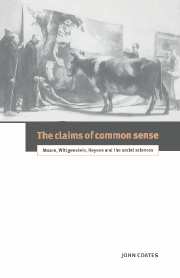Book contents
- Frontmatter
- Contents
- Preface
- Introduction
- 1 A short history of common sense
- 2 Ideal languages and vague concepts: the transition in Cambridge philosophy
- 3 Keynes and Moore's common sense
- 4 Keynes's later views on vagueness and definition
- 5 Samples, generalizations, and ideal types
- 6 The Cambridge philosophical community
- Conclusion: complexity, vagueness, and rhetoric
- Index
Conclusion: complexity, vagueness, and rhetoric
Published online by Cambridge University Press: 19 September 2009
- Frontmatter
- Contents
- Preface
- Introduction
- 1 A short history of common sense
- 2 Ideal languages and vague concepts: the transition in Cambridge philosophy
- 3 Keynes and Moore's common sense
- 4 Keynes's later views on vagueness and definition
- 5 Samples, generalizations, and ideal types
- 6 The Cambridge philosophical community
- Conclusion: complexity, vagueness, and rhetoric
- Index
Summary
LOOKING FOR AN EXIT FROM LANGUAGE
As the formalizing and programmatic zeal of early analytic philosophy faded, Cambridge philosophy began drifting from its commitment to the ideal language of logical atomism. Ramsey and Wittgenstein were the leading apostates and began to focus on the recalcitrant vagueness of our common sense. Early in the thirties Keynes understood the import of the new ideas and extended them into the philosophy of the social sciences. Wittgenstein and Ramsey remain today influential philosophers, and their ideas continue to play a role in current debates. Keynes's contribution, however, charts out a position which should be given closer consideration in contemporary discussions of the philosophy of the social sciences. For it is of continued relevance in defending common sense against the criticisms voiced against it today by many positivists and philosophers of formal semantics, on the one hand, and by post-structuralists on the other. What these critics take to be a defect in natural language, its vagueness, Keynes took to be a valued property in simplifying theory. He has shown that the use of ordinary language does not leave us mired in contradiction and undisciplined thought. Between the alternatives of metaphorical jouissance and an austere canonical notation there is a middle route, and its viability has been argued for, and displayed, by Keynes.
Arguing for a role for ordinary language and common sense in the social sciences, however, involves defending forms of knowledge that philosophy has traditionally believed to be unreliable.
- Type
- Chapter
- Information
- The Claims of Common SenseMoore, Wittgenstein, Keynes and the Social Sciences, pp. 147 - 175Publisher: Cambridge University PressPrint publication year: 1996
- 1
- Cited by



